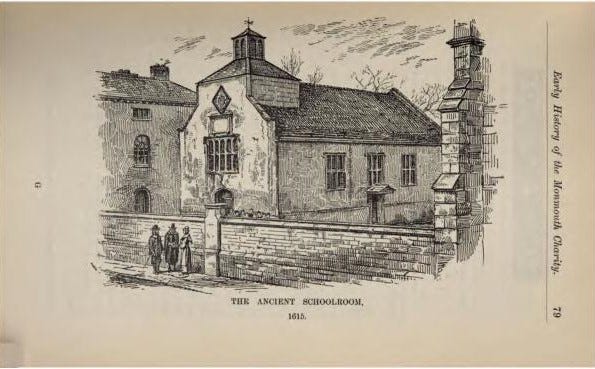The education of Philip Chauncy
An unconventional education, largely shaped by his father’s ideals and limited access to formal instruction
In 1877 my third great grandfather, Philip Lamothe Snell Chauncy (1816 – 1880), wrote an autobiographical memoir which he dedicated to his oldest son, William Snell Chauncy (1853 – 1903). The State Library of Victoria holds a copy.
The memoir begins with a brief sketch of Philip’s father (I wrote about it this last November, in Philip Chauncy’s memories of his father William Snell Chauncy,)
Later in the memoir, having recounted the family’s travels in France between 1821 and 1825, Philip talks about his education. On page 26 [sheet 44] Philip mentions in passing a school in Geneva: “As this paper is written for the information and amusement of my dear children, I may remind them that we have now in use a clothes brush bought by my grandmother as a portion of my outfit for school at the Rev. Caesar Malan‘s at Geneva. …”* Philip, then nine years old, visited Malan’s school for only a few days in 1825.
In 1825 Philip and family returned to England, soon afterwards moving to Wales. They first lived at Laugharne, Carmarthenshire. After two years there they moved to accommodation near the town of Monmouth and a year later, in July 1828, moved into Monmouth itself. Philip, born 1816, was then twelve years old. He had two sisters and five half-siblings:
Theresa 1807–1876
Martha 1813–1899
Half-siblings
William 1820–1878
Eunice 1821–1892
Hugh 1823–1900
Anna 1825–1838
Sophia 1827–1903
Philip wrote:
Down to this time none of us had ever been to school excepting Theresa who attended a Day school for some time before we went to France. – My Father had mostly taught us himself. Though we had a Mr. Bland a tutor for a few months at Laughame and I have a faint recollection of one or two others having instructed us in a little elementary learning for brief periods. At Monmouth however my father sent me and William and Hugh for nearly a year to the grammar school of the Revd John Oakley Hill. After this I used to receive lessons for a few months privately from the Revd Mr. Loader. – My Father had a great objection to sending us to school, especially to a large school, on account of. the irreligion and immorality generally learned at such establishments. – Indeed although we had travelled so much, there can be very few families in our station in life who have grown up in such utter ignorance of the world as ourselves.
I did not begin to learn to write until I was ten years old (vide my first copy among private papers) At Mr. Hill’s school I made some progress in Latin, Geography and arithmetic and when I left it Mr. Hill presented me with a prize accompanied by a kind note.

In 1830 the family moved to Worcester.
While at Worcester William and I went to School for a short time to the Revd Geo. Redford’s – who took in a few pupils beside his own sons. – This and the schooling I had at Monmouth, altogether under two years, was all the tuition I ever had away from my Father’s house, excepting a little instruction in Greek which I received from Mr Molland at Margate in 1832.
Philip, always interested in his surroundings, became a noted amateur ethnographer. Besides his biography of his sister and second wife: the Memoirs of Mrs Poole and Mrs Chauncy, he contributed to Robert Brough Smyth‘s The Aborigines of Victoria (Melbourne 1878), supplying an appendix, ‘Notes and Anecdotes of the Aborigines of Australia’.
Despite his unconventional education, largely shaped by his father’s ideals and limited access to formal instruction, Philip’s later writings are a testament to his determined learning, brief and scattered as it was.
* César Malan (1787 – 1864) was a Swiss Protestant minister, known for his high Calvinist theology, who was defrocked for doctrinal errors.
Related post
First published at https://anneyoungau.wordpress.com/2025/01/04/the-education-of-philip-chauncy/


Very interesting as always Anne. Quite surprising to reading of travel in the 1820s. I know it was possible, but none of my family would have been travelling in the early 19th century
What a great read, thank you